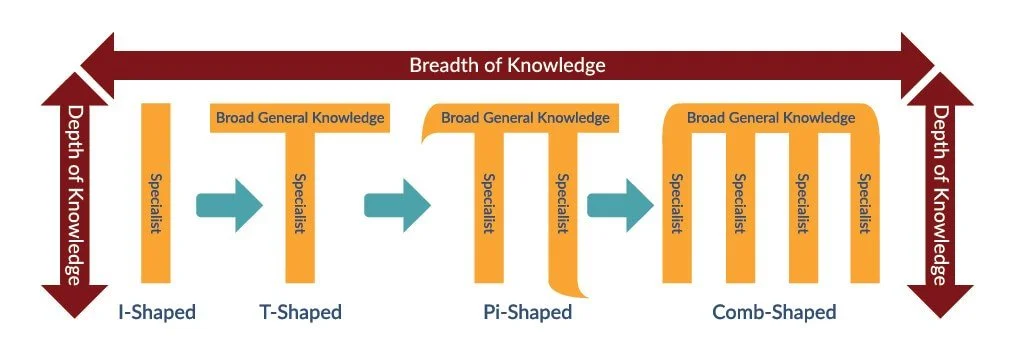Avoid the Unicorn Trap: Hire the Right People, Not Mythical Creatures
Rethinking the Future of Agile Coaching, Role Fluidity, and the Skills We Really Need
I recently led a workshop for a group of Lead Agile Coaches titled ‘Enterprise-wide Agile Transformation'. In one section, ‘People & Culture as Enablers of Enterprise Agility’, I found myself delivering what could have sounded like a bleak message for the future of their roles...That fewer organisations are hiring Agile Coaches by name.
But this doesn’t mean agile coaching is dead, it means that the skillset coaches have are valued everywhere.
The role of “Agile Coach” is evolving.
Agile Acumen Without the Job Title
Today, businesses increasingly expect agile thinking across many functions. The role of “Agile Coach” is morphing into a capability embedded across Delivery Leads, Product Owners, People Partners, and beyond. I’m seeing this more and more in the UAE. (However, I still see a relatively strong market in the UK and Europe for Agile Coaching-specific roles.)
At first glance, this might feel like a threat to those in coaching roles. But I see it as a call to evolve.
I’ve always believed in building teams with people who wear many hats, individuals who bring depth in one area and curiosity in others. As an Exec Delivery Director and Head of Agile Delivery, I focused on hiring people from diverse backgrounds who could flex with the needs of each client.
But this model only works if we respect its limits.
When done well, individuals are coached, mentored, and gradually exposed to new domains. When done poorly, people are thrown into engagements without support, expected to “perform” with little context or backup. The result? For the individual - burnout, impostor syndrome, and broken trust. For the client or key stakeholders - late delivery, low value, poor quality, and broken trust.
Combed-Shaped Skills or Just Unicorn Chasing?
I'm seeing more and more job specs where the level of skills diversity expected feels excessive and unrealistic. There’s growing pressure for people to be “Comb-shaped”, to have deep expertise in three or four areas and broad capabilities across many. In theory, this supports agility. In practice, it often becomes a cost-cutting tactic: one person replacing three or four.
I’m all for skills diversity, I’ve built multi-hatted Product Delivery Teams which work well. However, when ‘“Pi-shaped” becomes “Comb-shaped” we may have crossed the line from versatility into stupidity. The search for unicorns becomes a race to fill unrealistic job specs, and agility suffers under the weight of under-supported generalists.
Avoiding the Trap: When Skill Diversity Becomes a Shortcut
Diversification must be done strategically, not reactively.
In the joint report “Skills in the New World of Work – Which Agile Skills Are Most In-Demand in Today’s Workforce?” by Scrum Alliance and the Business Agility Institute, a key insight stood out:
“As businesses continue to seek improved productivity and performance, individuals with the right combination of skills and experience become harder to find.”
The study shows that the most in-demand skills in job descriptions are core competencies typically held by Agile Coaches—skills equally vital across technical teams, product management, and leadership roles.
This shift signals something important: what were once dismissed as "soft skills" - collaboration, empathy & emotional intelligence, coaching & facilitation - are now being recognised as critical enablers of business agility.
This rebalancing between functional and human skills can go wrong when misunderstood or misapplied. Traps to avoid include:
Assuming all skills are easily transferable
Overloading roles as a cost-saving exercise
Prioritising functional expertise while undervaluing human-centric skills
Hiring based on personality or likeness (“Let’s get another Alya!”) instead of true role fit
Neglecting the deep expertise required in specialised domains
Creating environments where the blind lead the blind, and no one feels safe admitting it
Are we seeing the Dunning-Kruger Effect in action?
The Dunning-Kruger effect highlights how people with low ability often overestimate their skills, because they lack the awareness to recognise their own limitations. In a culture that rewards confidence over competence, this bias thrives.
Are today’s blended roles and “just be agile” expectations fuelling this dynamic?
If we push people to wear too many hats, without providing time or support to grow essential skills, we end up with “fake it till you make it” environments, where no one feels safe to say, “I don’t know.”
The Dunning Kruger Effect
From Unicorns to Growth-Minded Teams
In a race to hire ‘unicorns’ we risk setting unrealistic expectations and overlooking the value of humble, high-potential, growth oriented individuals.
Here’s what organisations can do instead:
Stop hiring for unicorns - Start designing for teams, not mythical creatures.
Foster a growth mindset - Prioritise curiosity, feedback, and the humility to admit gaps.
Create skill mobility, not role chaos - Talent marketplaces and cross-functional guilds can help, but only with clear support.
Build learning organisations - Make it safe to not know. Make it normal to grow.
Develop leaders who back their people - Leaders must coach, not just manage.
The Future of Agile Coaching
Agile Coaches may not always carry that title in the future, but their skills are more essential than ever. Facilitation, systems thinking, emotional intelligence, and coaching for performance are critical across a wide variety of roles, teams and business environments. Employers are moving more towards a greater awareness of the balanced needed between Human and Functional skills.
The opportunity is to evolve the coaching mindset into every corner of the organisation.
Closing Thought
In a world of complexity, the smartest people are often those who know what they don’t know. Business agility isn’t about having all the answers, it’s about creating the right environment to ask better questions.
Let’s stop chasing unicorns and start building adaptable, empowered teams.
A Little Disclaimer:
My words are my own. Whilst Chat GPT and other AI tools are amazing resources to check my grammar, suggest better formatting and provide catchy headlines when the brain fog sets it, it cannot provide verifiable data without substantiation. It cannot replace experience or the passions and inspirations which fuel our professional lives. Any data and trends I have included have been substantiated via the sources I provide. The insights given in this article are based on my +22 years professional experience, my +8 years in senior leadership roles in The UAE & UK, plus my own wide-ranging research. If this article has resonated with you please feel free to comment and share, feedback is always welcome and appreciated.



